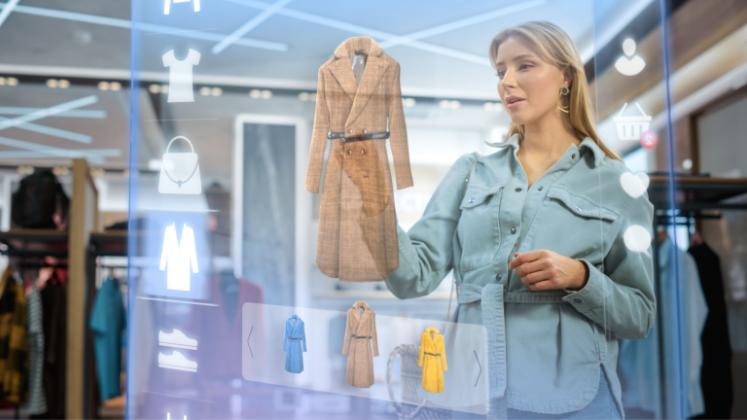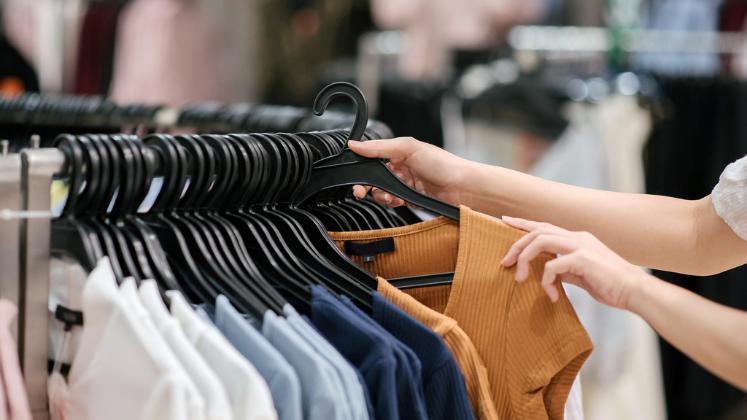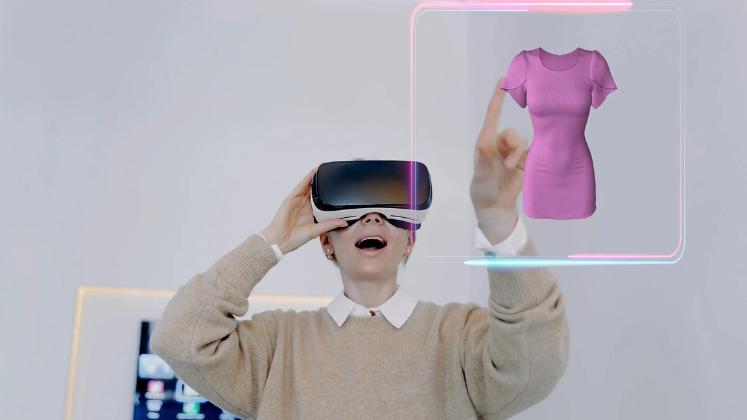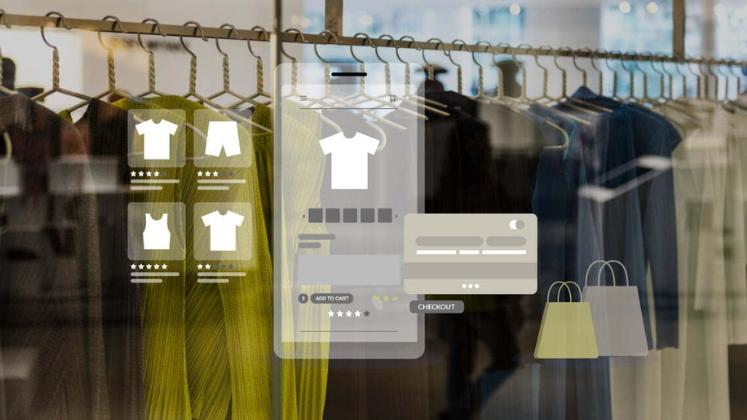The existing fashion retail business has faced significant vulnerabilities in recent times, prompting a shift towards technology-driven solutions in retail operations. In India too, the retailers digitalising retail operations is a reality. Indian fashion retailers have sensed this need for good and are streamlining operations by automating routine tasks like customer service and fulfilment. This transformation extends to the adoption of smart payment methods and self-checkout systems, while the integration of AR/VR, metaverse, and extended reality (XR) is empowering retailers to deliver highly personalised customer experiences and streamline operational processes. At present, retailers are working with third-party service providers to understand their customer demands. The story unveils the latest retail innovations that Indian fashion retailers are adopting for enhanced customer experience.
Retail Fulfilment: Managing inventories and warehouses with tech
The focused tech interventions are reshaping strategies around retail fulfilment to enhance market penetration. Last-mile delivery services and micro-fulfilment centres are on the rise, meeting the demand for same-day or faster deliveries. Retailers are repurposing stores and collaborating with logistics partners for local and hyper-local delivery. Additionally, automating fulfilment services addresses worker shortages, enables instant fulfilment and improves order tracking.
Traditionally, Indian fashion retailers have grappled with challenges in meeting customer orders, such as the absence of a nationwide fulfilment network for quicker deliveries during sales seasons. Managing sales across various platforms and handling returns on marketplaces has also been complex.
Brands like Bliss Club utilise AI-powered inventory optimisation tools, managing over 400 SKUs efficiently. The brand has partnered with WareIQ to develop a flexible pan-India fulfilment network which allows the brand to open two new warehouses in new locations easily and store its inventory closer to customers and facilitate faster deliveries at lower costs by improving its regional share of shipments by more than 30 per cent.
Denim and casualwear brand Killer Jeans has invested in a large warehouse of 100,000 sq. ft., adopting business intelligence tools and partnering with Logic ERP for sales process automation. The company now makes best use of auto replenishment solution to optimise inventory replenishment, which is intended to improve customer satisfaction. Lakhbir Singh, Brand Head at Killer Jeans, says the use of automatic replenishment solution has enhanced inventory turnover of the brand by six-fold.
Amidst the tech-transition that’s happening in Indian apparel retail stores, UNIQLO in India provides handheld devices to store employees not only to check stock inventory in real-time, but also access information such as product descriptions and daily sales data. Previously, the customers had to wait while employees manually checked stock shelves for items or looked up for information on a PC.
V-Mart is collaborating with Supplymint, using DigiARS – an AI and ML-powered analytics software – for digital demand planning and inventory management. According to Jayesh Kothari, President of Retail and Sourcing, V-Mart, the retailer first corrected its manual input data which had nearly 25 per cent – 35 per cent errors. “Through digitalisation, a thorough analysis was conducted on 4 to 4.5 million fashion items. This included refining product details, identifying demand regions, projecting inventories and analysing sales data – all aimed at enhancing the overall customer experience,” mentioned Jayesh.
Snitch, an emerging menswear brand, has integrated end-to-end technology in its fulfilment process, dispatching over 3,000 orders per day in a streamlined manner. Every operation is tracked through the Order Management Systems (OMS) / Warehouse Management Systems (WMS) for order fulfilment. “The expansion of our warehouse from 4,000 to 30,000 square feet and partnering with technology is seen as a crucial milestone for effective nationwide fulfilment,” said Siddharth R Dungarwal, Founder of Snitch.
Solution providers for retail fulfilment in India: Falcon Autotech, Addverb, WareIQ, Aaj Enterprises, QuickShift, Eshopbox and Dematic etc.
| “The expansion of our warehouse from 4,000 to 30,000 square feet and partnering with technology is seen as a crucial milestone for effective nationwide fulfilment.” Siddharth R Dungarwal Founder of Snitch |
Immersive Customer Experience: AR, VR, XR making a difference
Creating an engaging customer experience is crucial for their loyalty, driving repeat sales and minimising product returns. Immersive technologies like AR and VR today are being embraced by the fashion retailers to deliver captivating shopping experiences, including virtual try-ons, personalised recommendations and 3D product visualisations, particularly within the metaverse.
The concepts such as the metaverse, non-fungible tokens (NFTs) and gamified brand experiences are being leveraged for retail marketing as a form of entertainment, known as ‘retailtainment’. Such strategies have proven effective in enhancing brand engagement and building loyalty, especially amongst Gen Z shoppers. Bestseller India’s metaverse collection for Jack & Jones stores pan India is the perfect example of metaverse integration into retail stores. The shoppers can witness in-store traditional banner branding in an entirely new avatar.
Moving beyond metaverse, the brands are also aiming at enhancing customer experience in-store through other automated technologies. Lee, for example, has recently launched a tech-enabled store in Bengaluru that incorporates various features, including Electronic Shelf Labels for real-time in-store communication, smart mirrors and tablet screens providing real-time updates on offerings.
Reliance Retail’s fashion brand, Azorte, has incorporated augmented reality (AR) technology to enable users to virtually try on garments, accessories and home decor items before completing a purchase. This immersive feature seamlessly connects online and offline shopping, offering customers a more lifelike preview of products and boosting their confidence in making informed decisions.
In addition to the AR experience, Azorte prioritises customer support by implementing virtual shopping assistants equipped with natural language processing (NLP) capabilities. These round-the-clock assistants are dedicated to answering queries, providing product recommendations and guiding users throughout their shopping journey.
Other known brands that are making significant strides towards providing immersive experience to the customers are Madame, Zivame and Style Up amongst many other names.
“Madame launched its metaverse store on PARIZ Metaverse build by Trace Network Labs. Customers can interact with a metaverse store by navigating through a virtual environment. They can browse and interact with products in various ways, such as trying on virtual clothing or testing out virtual products. To make purchases, customers can place on Madame’s official online store, glamly.com which is synced with Meta store. Products can be delivered to the customer’s real-world address. Features and functionalities available in a metaverse store can vary, but some common ones include social interactions and immersive product displays,” commented Akhil Duggar Jain, Executive Director, Madame.
| “Features and functionalities available in Madame’s metaverse store can vary, but some common ones include social interactions and immersive product displays.” Akhil Duggar Jain Executive Director, Madame |
Solution providers for immersive customer experience in India: KiXR, Antier, BigThinx, Trace Labs, Unstitched, XR Couture etc.
Smart checkout: Cashless and no queue concept gaining ground
Picture entering a retail store, selecting the items you wish to buy, proceeding to the checkout counters and completing the entire transaction without any human intervention, or the use of cash! This was not the norm in the Indian retail landscape a few years ago. However, with the advancement of technology and the growing awareness among consumers, innovative concepts like contactless payments and cashier-less checkouts have found a significant place, enhancing convenience and reducing customer wait times.
Originally prevalent in grocery stores and supermarkets like Watasale in Kochi and Sunnybee in Chennai, smart checkout systems have rapidly gained traction in the Indian fashion retail industry. Major retailers such as Decathlon, Shoppers Stop, Lifestyle, Azorte and Zara in India have embraced technologies like sensors, near-field communication (NFC) and biometrics to automate and authenticate retail payments. As smartphones serve as the primary digital touchpoint for most customers, mobile checkouts have become imperative. Contactless point-of-sale (POS) solutions, such as scan-and-go leverage users’ smartphones for payment authentication. Additionally, facial ID checkouts and wearables using biometrics are gaining attention amongst Indian retailers.
For instance, in Bengaluru, Adidas has introduced a self-checkout counter allowing customers to pay by scanning the barcode. The company plans to expand this initiative to more stores, particularly in smaller cities, where digital wallets and UPI platforms have made contactless payments accessible.
Decathlon, a leading German sports goods retailer, is one of the pioneers in India to introduce scan-and-pay technology, enhancing the customer experience. Those familiar with Decathlon’s stores can attest to the efficiency of the point-of-sale process, thanks to RFID-enabled checkout solutions. This technology eliminates the need to scan each product individually at the checkout counter, as all items are scanned simultaneously, ensuring a swift and convenient shopping experience for Decathlon India’s customers, ultimately contributing to increased satisfaction and loyalty.
Solution providers for smart checkout in India: Avery Dennison, GoKwik, VasyERP, GoFrugal, Ginesys, Aaryahaan etc.
| The need for innovation in traditional Indian retail stores
Traditional retail stores (and e-stores) encounter several challenges that necessitate innovation to enhance their operations. One key challenge is limited inventory due to physical space constraints, resulting in frustrated customers unable to locate desired items. Technological solutions, such as AI, can alleviate this issue by enabling retailers to present an extensive array of products via digital catalogues and online platforms. Another hurdle is the scarcity of detailed product information, including size, colour and style choices. This deficiency can prompt customers to leave without purchasing. Technologies such as handheld devices to check stock inventory in real-time, can mitigate this concern by offering inventory’s real-time information. Personalised experiences are also constrained within traditional retail stores, as tracking customer preferences manually proves difficult. Consequently, opportunities for tailored recommendations and promotions are missed. Technology, employing data analytics and AI algorithms, can overcome this obstacle by monitoring customer behaviour and providing personalised suggestions. Additionally, convenience remains limited in conventional retail set-ups, with time-consuming checkout queues, and restricted operating hours. Technology addresses this challenge by introducing self- checkout options, mobile payments and extended shopping hours facilitated by online platforms. |
Unified Commerce: Omni approach assisting retailers in understanding consumer preferences
Retailers, whether rooted in digital or traditional bricks-and-mortar spaces, are increasingly adopting a cohesive strategy to capture consumer attention. Both large and small physical retailers are incorporating e-commerce and mobile commerce elements, while online-only merchants are exploring innovative ways to provide tangible experiences to their customers. The emergence of phygital retail facilitates a seamless transition to a D2C strategy, allowing retailers to adapt to compact, low-inventory store formats.
Hence, it becomes essential to integrate every digital interface within the organisation into a unified platform to stay up in the game and retailers have realised this. This integration spans offline stores, websites, apps, warehouse management systems, logistics, payment gateways, ERP, CRM and more.
Given that many existing systems in Indian fashion retail were not initially designed for an omnichannel environment, a significant challenge arises in aligning these diverse systems onto a unified platform, ensuring they are all omnichannel-ready. As a considerable portion of customers engage in shopping through both online and offline channels, creating a ‘single view of customer’ becomes imperative for retailers, enhancing their understanding of the customer’s preferences and behaviour.
Therefore, brands like Being Human Clothing, have implemented AI/ML-enabled CRM solutions, which helps them create customised solutions for their customers. “All these unique experiences will be pivoted around omnichannel solutions. Post implementation of our unification of systems, our customers are able to Buy Online and Pick-up in Store, or are able to Buy Online and Return at Store,” shared Vivek Sandhwar, COO, Being Human.
| “All the unique experiences gained from AI/ML implemented will be pivoted around omnichannel solutions. Post implementation of our unification of systems, our customers are able to Buy Online and Pick-up in Store, or are able to Buy Online and Return at Store.” Vivek Sandhwar COO, Being Humana |
The new stores of Wrangler in India offer an omnichannel feature to their customers using which they can place orders online and opt for in-store pickups or leverage the endless aisle application to order products not physically available, receiving deliveries at their preferred address.
Solution Providers for Unified Commerce Platform / Omnichannel in India: WebEngage, CleverTap, Browntape, Blue Yonders, Unicommerce, Unifynd, Shopify etc.


























